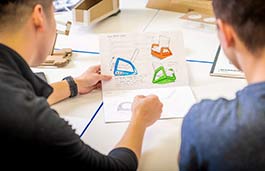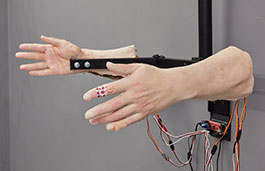Search
Graphic Design MA
Study level: Postgraduate
Prepare for a career in graphic design and learn about modern practices, digital and analogue media, and global design with this course.
Course features
Year of entry
Location
Coventry University (Coventry)
Study mode
Full-time
Duration
1 year full-time
Course code
CAST006
Start date
January 2026
March 2026
May 2026
July 2026
Course overview
This course enables you to take command of your own design practice and theory interests, establishing personal lines of enquiry that will be developed and refined during the course’s study journey.
- Designed for graphic design graduates, professionals and applicants repositioning their creative practice seeking to enhance their professional portfolio.
- Broaden and deepen your understanding of contemporary graphic design and its future.
- Develop your practice and research skills relevant to industry or for future graphic design academia.
5 QS Stars for Teaching and Facilities
QS Stars University RatingsRanked 9th Modern University in UK by the Times
The Times and Sunday Times Good University Guide 2025Ranked 4th for Overall Satisfaction in PTES
Postgraduate Taught Experience Survey (PTES) 2025Why you should study this course
This course aims to help you:
- follow a focused line of enquiry, building on your skills and knowledge, and culminating in a final self-directed project
- focus on digital and analogue media, with an emphasis on contemporary graphic design practices
- focus on modern, relevant practices shaped by broader cultural debates within the graphic design field
- get a practical, ideas-based curriculum encouraging you to develop a unique professional voice
- get hands-on project-based learning that mirrors industry and professional creative team environments.
Collaborations

Endorsement by the Royal Society for Arts, Manufactures and Commerce (RSA)
Coventry University and the RSA have collaborated on a module concerning social and ethical responsibility. You will be entitled to a 12-month fellowship of the RSA so you can access all RSA resources and platforms during your period of study. Once you have successfully passed the Professional Practice and Innovation module, you will receive an RSA digital credential.
What you'll study
We regularly review our course content, to make it relevant and current for the benefit of our students. For these reasons, course modules may be updated.
How you'll learn
The course uses a project-based approach that challenges you to debate and interrogate graphic design ideas and principles in the context of industry norms and your informed approach to your own practice.
Teaching and learning methods may include:
- lectures
- seminars
- tutorials
- presentations
- group projects
- workshops
- practical laboratory sessions.
Teaching and learning hours
As a full-time postgraduate student, you will study modules totalling 180 credits each academic year. A typical 30-credit module requires a total of 300 hours of study. Study hours are made up of teaching and learning hours, and guided and independent study.
Teaching hours
Teaching hours will vary, depending on where you are in your studies, but on average, you will have between 8 and 12 teaching and learning hours each week. You will also have the opportunity to attend optional sessions, including time with a Success Coach or to meet with staff for advice and feedback.
Guided and independent learning
Throughout your studies, you will be expected to spend time in guided and independent learning which will make up the required study hours per module. You will be undertaking a variety of activities, learning through guided background research, planning and preparation, studio activity, creative practice and making, reviewing what you have learned and completing assignments. This can be completed around your personal commitments. As you progress towards the end of your studies, you will spend more time on independent learning.
Online learning
As an innovative university, we use different teaching methods, including online tools and emerging technologies. So, some of your teaching hours and assessments may be delivered online.
Assessment
This course will be assessed using a variety of methods which could vary depending upon the module. Assessment methods include:
- reports
- essays
- practical coursework
- assignments
- presentations.
The Coventry University Group assessment strategy ensures that our courses are fairly assessed and allows us to monitor student progression towards achieving the intended learning outcomes.
Entry requirements
Typical entry requirements:
Fees and funding
| Student | Full-time | Part-time |
|---|---|---|
| UK, Ireland*, Channel Islands or Isle of Man | £11,200 | Not available |
| EU | £11,200 per year with EU Support Bursary** £18,600 per year without EU Support Bursary** |
Not available |
| International | £18,600 | Not available |
For advice and guidance on tuition fees3 and student loans visit our Postgraduate Finance page and see the university's Tuition Fee and Refund Terms and Conditions.
We offer a range of international scholarships to students all over the world. For more information, visit our International Scholarships page.
Tuition fees cover the cost of your teaching, assessments, facilities and support services. There may be additional costs not covered by this fee such as accommodation and living costs, recommended reading books, stationery, printing and re-assessments should you need them.
The following are additional costs not included in the tuition fees:
- Any optional overseas field trips or visits: £400+ per trip.
- Any costs associated with securing, attending or completing a placement (whether in the UK or abroad).
*Irish student fees
The rights of Irish residents to study in the UK are preserved under the Common Travel Area arrangement. If you are an Irish student and meet the residency criteria, you can study in England, pay the same level of tuition fees as English students and utilise the Tuition Fee Loan.
**EU Support Bursary
Following the UK's exit from the European Union, we are offering financial support to all eligible EU students who wish to study an undergraduate or a postgraduate degree with us full-time. This bursary will be used to offset the cost of your tuition fees to bring them in line with that of UK students. Students studying a degree with a foundation year with us are not eligible for the bursary.
Facilities
Comprehensive taught sessions are delivered in our collaborative-focused graphic design studios in the newly designed Delia Derbyshire Building. You may have access to facilities ranging from photography studios to immersive labs, printmaking workshops to 3D spaces. Our modern technical studios enable you to bring your graphic design visions to life.
Unleash your creativity with our Media Loan Service. Borrow a wide range of audio-visual technologies to support your time-based productions. Experiment with professional equipment to elevate your graphic design projects.

Lanchester Library
The library is usually open 364 days a year. It’s where you can access your course’s specialist Academic Liaison Librarian. It’s also home to specialist teams which can support you with your academic writing and maths and statistics questions.

The Hub
The Hub is the centre of student life on campus. Facilities include a food court, convenience store, multi-faith centre, medical centre, hairdresser, coffee shops and the Your SU offices. It has fully licensed function spaces and a bar.

Careers and employability
Get one-on-one guidance lasting up to 18 months from the end of your course. We’ll help you find placements and graduate roles, offer CV and application checks, mentoring, skills workshops, employer events and more.
Facilities are subject to availability. Access to some facilities (including some teaching and learning spaces) may vary from those advertised and/or may have reduced availability or restrictions where the university is following public authority guidance, decisions or orders.
Careers and opportunities
Successful graduates may seek positions as a:
- Graphic Designer
- Art Director
- Creative Director
- Advertising Designer
- UX/UI Designer
- Front-end Web Developer
- Brand Identity Designer
- Packaging Designer
- Illustrator
- Motion Graphics / Animation Designer
- Digital/Print Designer
- Editorial Designer (magazine, book, newspaper)
- Typography Designer
- User Experience Researcher
- Design Consultant
- Artworker
- Freelance Designer
- Set Designer (film, TV, theatre).
On successful completion of this course, you will be able to:
- show a clear understanding and use of key ideas and themes within your chosen area to develop advanced skills in graphic design
- use advanced skills, techniques and new technologies creatively to bring fresh ideas and innovation to graphic design
- create complex and ambitious graphic design projects or artefacts tailored for different audiences and contexts
- actively contribute to the shaping of a global contemporary discourse by engaging with experimental, creative and hybrid approaches to graphic design practice
- use advanced tools and methods to apply creative solutions in various professional, social and collaborative settings, driving social change
- demonstrate a clear understanding of how creative teams contribute to the success of design projects
- create innovative solutions in graphic design that address global challenges, market needs, and the specific contexts of clients and users
- tackle complex problems with critical thinking, while upholding ethical standards in graphic design and considering broader societal impacts.
Where our graduates work
Successful graduates of this course have gone on to work for companies including:
- DCA Design International, Warwick, UK
- Dafy.agencia, Madrid, Spain
- SOAP! Presentation, Lisbon, Portugal
- ME+EM, Lincolnshire, UK
- Deeply Digital, Leamington, UK
- PwC, The Middle East.
How to apply
You may also like

Product Design Innovation MA






